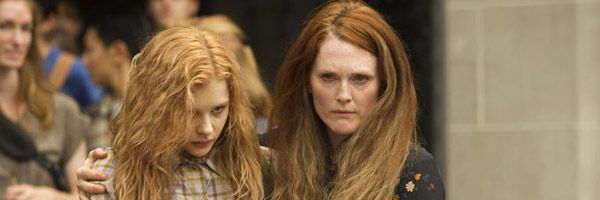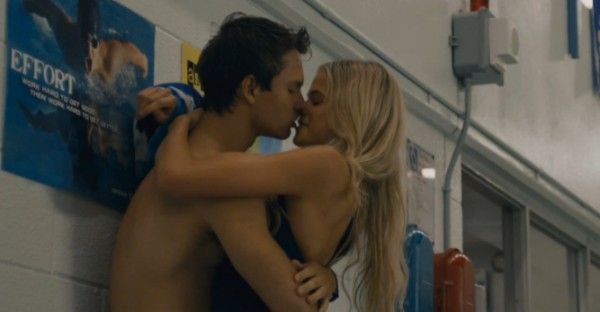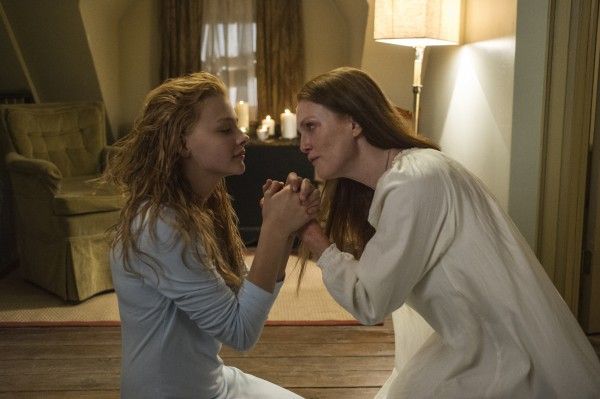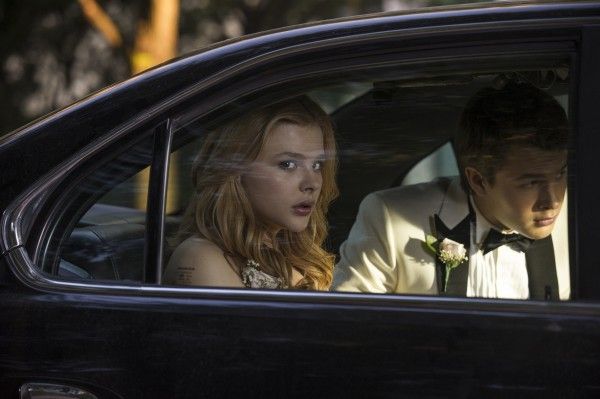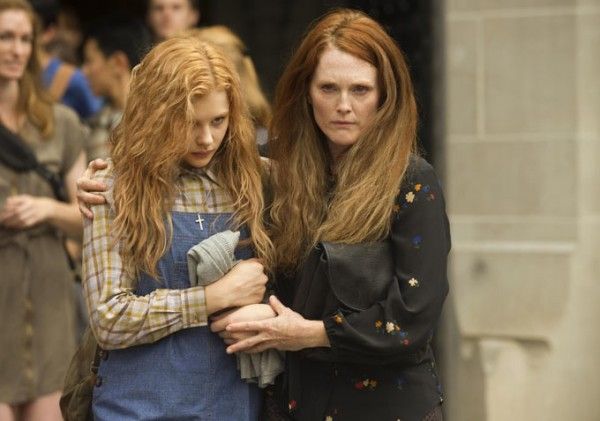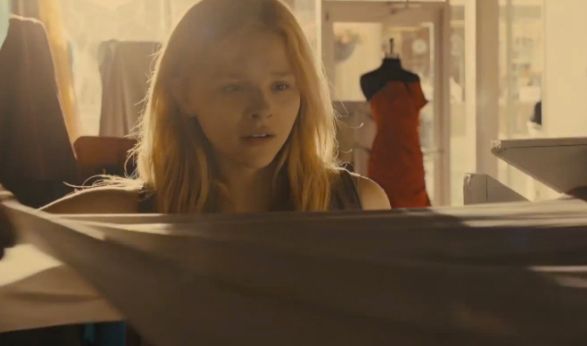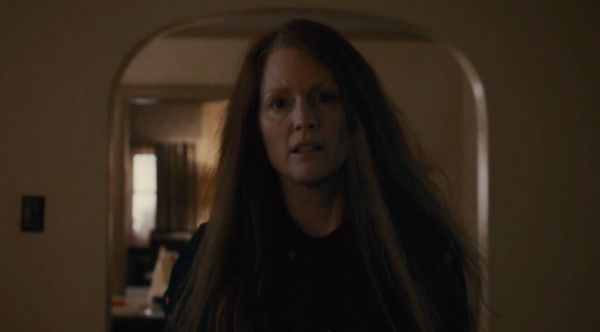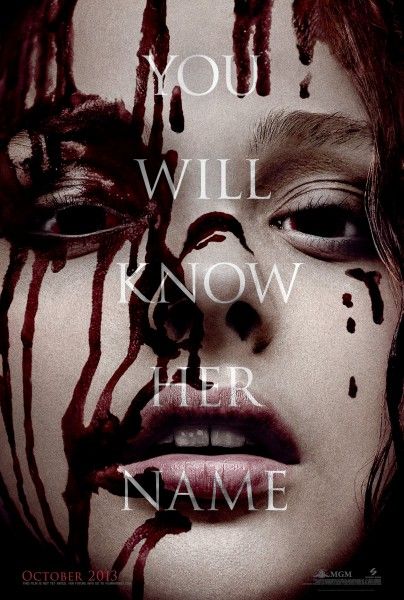While it’s great to talk to cast members while on a set visit, the interviews with the film’s producers almost always prove to be the most revealing. These are the people who have been with the project for the long-haul and are overseeing every single decision that’s being made as it moves towards production. Thusly, if you want to know the ins and the outs of the new adaptation of Stephen King’s novel Carrie, producer Kevin Misher is your man. Misher’s resume spans a number of different genres, as he has produced action-oriented pics like The Rundown, period dramas like Public Enemies, and thrillers like The Interpreter. With Carrie, though, Misher is taking on a widely known property with a truly iconic predecessor.
While visiting the Toronto set of Carrie with a handful of other journalists, Misher spoke to us about why he wanted to make a new Carrie film, committing to an R-rating early in the process, how they went about casting the pic, choosing Kimberly Peirce as the director, balancing the horror aspect of the film with character-driven drama, the prejudice from fans that comes with tackling such a well-known property, Julianne Moore’s performance, and more. Hit the jump to read on, but beware of minor spoilers for those that haven’t read the book and/or seen De Palma’s film.
Question: What was it about this project that made you want to go through the long, arduous task of making it?
KEVIN MISHER: It actually hasn’t been that long. I came on in February. I think the opportunity to work on the classic Stephen King book — his very first book, that has, I think, even more relevance today than it did in the ‘70s when it first came out, it was a very — was a great opportunity. And I think the marriage of Kim Peirce, her sensibility and point of view on the world, married to the book was actually too exciting to pass up. That’s literally why I came aboard. If it was a different director or a different piece of material, one or the other, it might not have worked. But this combination of the two felt a little bit like kismet. And I can’t take credit for putting them together, MGM did that.
Can you talk about the cast? What with the original film, the stars of or the people in that movie. These guys all seem to have a good rapport. Things are looking pretty well. How did you get all these actors together?
MISHER: I think when you’re thinking of the cast that that movie started, but also when you’re thinking of any young group of actors that you’re going to put together, you immediately start to … I think anytime you put together a group of kids for a movie, you’re always talking about, ‘Let’s find the next group of kids.’ The threshold that I apply to every movie that I cast with young actors is that you always want to say — I always want to say — you want to look back on that movie and you want the audience, 15 or 20 years from now, to say, “Oh my God, they were all in that movie?” It’s like Taps or Young Guns. Whatever your relevant reference point is, I think you’re always looking to do that with a movie. I think what was incumbent upon us in this particular movie is that they did that in that movie. I think we held ourselves to a fairly high threshold. Chloe [Moretz] was first, obviously. And it was sort of a zero sum game. It’s like, Chloe Moretz, I think, was the first name I mentioned when I walked in the door. The first name that came to the floor. And she wanted to do it, so it was sort of kismet.
And the interesting thing with the first movie is… the fact that both those actors — Sissy [Spacek] and Piper Laurie — got Oscar nominations puts an extra added burden on casting the mother role. And again, I know people always say this, but there was sort of Julianne Moore and there was everybody else. Truly. There were a lot of names on the list who, at the end of the day, we would have patted ourselves on the back and said, “Well, we did all right.” But after Julianne Moore, we were like, “Now we’re in the thick of it with names.” And fortunately, Julianne loved it. What she’s done has taken it… I don’t think you’ll be able to look at Margaret White circa 2013 and think of Piper Laurie at all. It’s a completely different performance. Laurie is up here, Julianne is here. She’s playing a mother who… I think if Margaret White were sitting here, she would tell you she’s doing everything she can to protect her daughter. She said they [the other kids] would treat her daughter poorly, and she was right. Our whole thing is sort of like, Margaret White was right, actually. I think Julianne is a very, very loving mother who happens to have a horrible methodology. Which I think is fantastic for villains. Her endgame is right, but the way she goes about doing things is pretty hard.
The other cast members, we were just trying to find the best and brightest. And it’s not only about the individual, because you also have to find some chemistry amongst the four, and I think we found a great group. Some more famous than others, some never shot a foot of film. But, actually, when all of those individuals tested, there wasn’t anybody who tested afterwards. So, again, it’s not to say that we didn’t do a whole wide test of names, various names coming in — some more known, some less known — but when each of these young actors came in, that was the last time. We were sort of like, “That’s it.” You sort of knew it when you saw it.
You brought up an interesting dichotomy. Like you said, the original Carrie had Oscar nominations. And back then, they had The Exorcist. It’s a very interesting dichotomy between these dramas. These genre movies nowadays are very much shock-driven. Can you talk about balancing those two things and trying to get the drama that Kimberly is known for as well as still getting the excitement?
MISHER: That’s why I said Kimberly, doing this movie, was a very interesting kismet. When I heard, I said, “Wow, that’s an interesting choice.” Because it wasn’t just going to the shock of it all. It’s what’s going on behind us — you can say, “That’s cool. There’s blood and they kill a pig, there’s all this horror stuff that happens.” But the underlying drama is very real for the characters, and that’s what Kim presented the opportunity to do. I think we were, from the beginning, aspiring to make a classic horror movie. Which has real characters, not just shock scares. There’ll be shock scares in this, and some pretty tough stuff at times. But what’s as important as the horror of it all is also the evolving and inexorable suspense of it all. I think that that, hopefully, will be something different than the original movie had, because there are forces that are overtaking Carrie White that she’s not aware of. Chris is planning her situation, Sue is gradually learning of what is going on with Chris. All of those vectors that we built up in the beginning of the movie will hopefully collapse in a very suspenseful third act. That isn’t just the basic drama of, “Here’s a girl who gets shit on, and then there’s a girl who goes and does what she needs to do to not feel bad anymore.” There’s a lot more suspenseful beats that hopefully will come out of the movie.
This is a very female-driven story. The story of Carrie and her mother, and Carrie and these other girls. Do you feel like having a female director, having that female perspective, adds something to this project? Not to take anything away from De Palma, because it’s a totally different animal — but do you think that having that female perspective adds something to this?
MISHER: Yeah, without a doubt. It’s not only a female director, but I think particularly Kim Peirce and her point of view on the world. If you look at the angst that was driving the characters in Boys Don’t Cry, and the fact that those characters lived on the fringe, a little bit, but with the desire to be in the middle, is sort of what drove us all in high school and what probably what drives all of us today. Everybody wants to feel, “What’s normal? Where am I? How do I fit into the system?” I think that was Kim was experimenting with in both her films, but probably more primally in Boys Don’t Cry, it translates what very well.
You were asking about the genre horror of it all, and what they were doing back in the ’70s — the sort of Rebels on the Back Lot generation — I think that one of the things today is, because of the way Hollywood is right now, genre is the way that good drama is discoursed on. It’s hard to get just a flat drama made sometimes, and it’s hard to get the budget that you want for a straight drama. So, within the DNA of Carrie, is a very, very compelling drama that you can just tell at a dinner party or talk about after reading the book. I think that’s fairly compelling, but when you add the genre elements, you have the opportunity to appeal to a wider audience and still have something to say underneath it. So I think what Kim does is allow that to be both subtext and text, hopefully. If it’s all working and you’re firing on all cylinders, you can walk out on the movie sort of feeling like you were in an intense drama but also a really suspenseful thriller. Again, if it’s working, and we’re clicking on all cylinders, you get all of that. And I think you can have a classic movie as opposed to just a cool horror film.
Picking up from that, you mentioned the Rebels on the Back Lot generation, obviously the original film was made in a different era like that. This, where it’s increasingly hard to get your vision to the screen without studio interference, are people asking you to cut it down to PG-13?
MISHER: The studio from the beginning was very committed to an R-rated movie, which I found very interesting and compelling because being an old studio hand and producer who works mostly in the studio system, you’re always sort of discussing the PG-13/R-rated line. But I think, getting sort of filmmaker-driven, once you’re bringing Kim Peirce on to do Carrie, and what you’re selling here is not the gore and the shock and the splatter, as much as you’re selling the reality and the intensity and the suspense, I think then it naturally led you towards an R. Because if you’re going to have kids talk the way they talk in high school, and some of the stuff gets pretty dark and intense in terms of how the teenagers act out on their emotions, there was really only one way to go. There was never a real conversation… we discussed it, but it never really got more than a two percent moment in a conversation. It was always going to be an R-rated movie.
There are no images or footage released already, but people are already weighing in on Carrie being remade, and comparing it to the original. Does that bother you or concern you that people already have preconceived notions?
MISHER: The good and the bad, the double-edged sword, of a remake is that people are going to fall on both sides. I feel two ways about it. One is that when you take on a remake, there was something made before you. Hollywood hasn’t just remade movies — everybody says, “Oh, another remake!” but Hollywood has remade movies for years. Scarface was a remake. And now it’s pretty well revered, what De Palma did. But the original Paul Muni movie was fairly well regarded. I remember when De Palma’s Scarface came out, it was like heresy that anybody was touching it. But if you do it right for the generation that you’re doing it for, it can also become a touchstone. We worked really hard to try and let this Carrie speak to this generation. The other benefit of it is that you can actually speak to two generations. The nostalgia crowd, who, if the movie aspires to do what the original did, out of curiosity, love, and affection for the original movie, and then you have a movie about kids in high school, which will appeal to your core movie-going Saturday night multiplex audience. As a producer, with the opportunity to be involved with this, you sort of have the opportunity to wrap your arms around every opportunity available to you. You don’t get that on every movie. Sometimes you jump on something, and you say, “You got a quadrant.” Everybody throws around four quadrants, but I think the opportunity for four quadrants here is in the high level execution of it, if we pull it off.
Are there any cameos from the original film? Like The A-Team did. Was there ever a thought of having Piper Laurie show up for one scene?
MISHER: Not really. In The A-Team for instance, it was a TV show. They had… I don’t know what they had. Sometimes in that movie, they had their tongue firmly planted in their cheek, and sometimes it wasn’t anywhere in their mouth. But I think that this movie doesn’t really do that. I think that if suddenly John Travolta walked across the screen it would be a little bit of a jolt, certainly to a significant section of the audience. There are a lot of young kids who I know who don’t really know the original. They know the image of bloody Carrie, they may know the hand at the end, maybe they’ve heard of a “plug it up” situation. But I think that we wanted to do it clean and let it stand on its own merits.
Not to take anything away from the De Palma film, but in that movie, a lot of the supporting cast didn’t seem to be fully developed. Can you talk about how it felt important to see Chris’ origins and to see her relationship with Sue really unfold in this film, as opposed to being a supporting cast that are just a nice girl and a mean girl?
MISHER: I think that, going back to the book as inspiration or true source material, the book had the opportunity to more fully explore that. So, that was just a development that was interesting to us. I also think that in terms of the suspense thriller, which we were working on, having those vectors of characters evolving was really important. So, having Chris and Sue be friends at the beginning. And have that relationship with Sue and Chris evolve. Those two were splitting, as Carrie was evolving into becoming more of a Sue-like character. Going to the prom, and Sue is now sitting at home like Carrie would have been sitting at home. And Chris calling her out on it, and all of those forces colliding. That potentially gives you the opportunity, it gives you the roots of good suspense that I think will hopefully work side by side with the horror to give you something a little bit more.
When you have a movie with very specific beats that you know are going to be in the movie from having seen the original movie or read the book, how hard is it to build suspense or still have surprises and shocks?
MISHER: I think that’s about the characters. I think that you’re working with certain iconic images. You’re going to have the pig’s blood, you’re going to dump it on Carrie. You’re going to have to do something at the end of the movie that’s going to give a visceral thrill to somebody, and you’re going to have to do the plug-it-up sequence. I think that the only way you can make it unique and not live in the shadow of something else is to make the audience care about the characters. I don’t know any other way to do it. I guess, in some ways, if you have visual effects, you can “out-spectacle” the movie. There are certain movies I could point to where that’s what they’re trying to do. You’re like, “Oh, they couldn’t do this, but they could do that.” Or, “We could do this, but they couldn’t do it.” I don’t think that’s the case here. I think working inside character is the only way we can differentiate this Carrie from the old Carrie. We’re going to do certain things where we’re going to contemporize it, but we’re going to care about the characters in a way that you relate to them as contemporary figures.
Did you have any contact with Stephen King at all?
MISHER: We’ve communicated with Stephen King. I think the way in which he seems to operate with movies [based on his works] is that he wants to see the movie. That’s a good pressure to have, I think. You’ve got to walk the walk and talk the talk and ultimately put the product up. And I think that we’ll show him a good movie.
We talked a little bit earlier about the ending of the film, and Kim seemed to hint that it will be more than just the school being destroyed in the film’s third act.
MISHER: Again, I think it’s about the characters. If it’s working right, we’re working off Carrie trying to figure out who is behind what happened to her, and where that chase may take her presents different opportunities than the original movie did. Again, the carnage in the original movie, if I know my film history at all, I think it was driven by budget. Frankly, I think De Palma would have preferred to blow up a town, but I think that was sort of a late budget cut. So, we’re not quite blowing up a town, but there were more options available to us.
How much did the project change once that first draft was sent in? Were there pieces moved around?
MISHER: I think it just got richer. The story is sort of a more classic adaptation of the book. So I think once that first draft was done, it became about evolving certain things. Certain contemporization issues came up. So when Carrie is in — just as a way of example — when Carrie goes through the plug-it-up situation, in both the De Palma movie and in the book, she’s sent home at the end of the day. It’s like, “Too bad that happened. Go home.” And I think in this day and age, the mother would be called. So that changed the Margaret White character, because she was now going to come out of the house. Whereas Piper Laurie, the only time she went out of the house, I think, was to go to Sue’s mother’s house to go chastise her and berate her for her lack of religiousness. So I think it evolved organically in terms of certain changes that we made, but it wasn’t like we made wholesale changes from where the book was going.
Kim had talked about Julianne Moore. She’s this huge actress, and there’s certain times when she’d come on set and say, “I wouldn’t have her say it like that.” Are there instances that you were around for or that you were told about? Things that she wanted different?
MISHER: I don’t think it was different as much as Julianne Moore creating a character. In my experiences, with movie stars, part of the relationship with working with directors, is that they bring a certain — I don’t know what percentage to apply to it, but somewhere between 50% and 100% come having well thought out how they’re going to embody the character. And Julianne Moore came pretty prepared, after talking to Kim early and with and through rehearsals, the type of character she wanted to play. So it wasn’t so much… when you read the script, the shadow of Piper Laurie was long. So when you read the script, you couldn’t help but read the dialogue — some of which is the same, some is different — with Piper Laurie’s voice. Once Julianne Moore came onset, it was a different character. You actually never thought about, “Oh my God, she’s doing it exactly like Piper Laurie. What are we going to do?” It wasn’t so much that she was changing instances or little things about the character. She fully changed the character to embody it in the way that she wanted. That was the benefit of getting Julianne Moore. She sort of brought Margaret White… she channeled Margaret White. I know when she came on, she was like, “It’s going to be a rough…” I forget how many weeks she worked — four weeks? “It’s going to be a rough four weeks.” Because at various times, Margaret White is not the most pleasant of people. But she is entertaining. But there’s a very sweet relationship between her and her daughter at various times in this movie, that it actually breaks your heart that it’s not going to end well.
How game was she in terms of dealing with the violence and all that stuff — the house. Obviously, a lot of the young actors are really into that. Blood, and all that stuff. But was she game? I don’t think she’s ever done a genre or horror movie.
MISHER: No, but she knew what she was signing on for. Again, you’ll see it when you see it, but the way in which her Margaret White acts inside out movie is both wholly unique and very tied to the original. Not the original movie, but the book. I think that what she found is inspiration in the book and tried it to turn it into ways that it was surprising. She didn’t want to just be a bible-thumping, bible-hitting mother. I think she was looking for something else. And one of the things I think that was very innovative in the story, a real part of the book, a lot of King’s dialogue is Margaret White’s dialogue. But the Bible quotations that she’s giving Carrie are not real Bible quotations. And in the movie, Carrie calls her on that. So and that I think is completely unique to this movie. She’s like, “[nonsense]”, and Carrie’s like, “That’s not even in the Bible.” So you get that real teenager-mother relationship, and the religious relationship isn’t like Julianne Moore is playing some Bible-toting woman that you would know. Clearly, she’s bastardized that into her own form of controlling her daughter. So she could be a more classic villain. I think in that way, she found a way in which she was going to embrace her villainy in a unique way.
Can you talk a little more about how you modernized it for this generation?
MISHER: I don’t think you wanted videophones or whatever it is, Facebook, to take over the story. So again, working through… you asked about how the script evolved from the first draft. All we really did was try to lay in elements of Facebook and Internet bullying. But it didn’t become something that took over the story. We stayed very true to the Stephen King of it all, but in this day and age, somebody’s going to text somebody else. Nobody’s going to have to call somebody. Those things became part of a vernacular of the movie, but I don’t think it’s going to overwhelm the story at all. So it didn’t change the basic story of Stephen King’s Carrie.
At lunch you were talking about some of the comical elements of the story — you mentioned the radio. Can you mentions any others you thought of and what kind role that plays in the story beyond comic relief?
MISHER: It’s not so much comic relief as sort of making the characters real. Everybody’s not so serious. It’s like you are in high school, all the characters are riffing with each other. They’re all talking, they know each other, they’re friends. So in the middle of what can be a back and forth between Chris and Sue, they’re calling each other out on something that happened earlier in the movie. The way in which Carrie is having fun with — that’s the best one, so I’ll say it on the record — when Carrie puts her mom in the closet, she walks out of the house, and using her telekinesis, she turns the radio up loud so she doesn’t have to hear her mother yelling. That’s the best example I can give. Again, you’re riffing off of any relationship between mothers and daughters. Classic relationships. But you’re using telekinesis, and trying to have a little sense of fun. We tried to find those… not so much comic relief, as much as it is humanistic opportunities to make it feel like these are people that I know. Even though we’re talking about the actors, they are really classic archetypes. Chris is the mean girl. Sue is the good girl. Tommy’s the good guy. Billy’s the bad guy. You are working with these classic things, so you don’t want them to become boring tropes. So I think giving them all sense of humor, even though it might be macabre sometimes, was sort of critical to making the story work. A good laugh always takes the sting off of something that’s scary.
Catch up on the rest of our Carrie set visit coverage below:
- Collider Goes to Prom on the Set of CARRIE; 25 Things to Know About the New Adaptation
- Chloe Grace Moretz Talks Playing with Telekinetic Powers, the Grueling Audition Process, Preparing for the Role, and More on the Set of CARRIE
- Director Kimberly Peirce Talks Telling a Mother/Daughter Story, Modernizing an Iconic Property, the Level of Violence and Sex, Bullying, and More on the Set of CARRIE
- Judy Greer Talks Paying Homage to the Original, Being Heartbroken by Chloe Grace Moretz's Performance, and More on the Set of CARRIE

